News Brief
China Appears To Be Playing Down The Participation Of Tibetan-Origin Soldiers In Indian Military Operation In Ladakh
- China’s reaction to participation of Tibetan-origin soldiers in the operation was visibly muted, and Beijing appeared to be playing it down.

Prime Minister Narendra Modi and Chinese President Xi Jinping.
On the intervening night of 29 and 30 August, Indian Army, along with highly trained commandos recruited from the Tibetan refugee community in India and part of the Special Frontier Force, occupied heights in the area south of Pangong Tso in eastern Ladakh, preempting China’s People’s Liberation Army.
An irritated China released a series of statements containing boilerplate language — at least five by some accounts — in the days following the Indian operation to take heights in eastern Ladakh, but without any reaction to the news of participation of Tibetan-origin soldiers in the same operation.
This, China watchers pointed out, was unusual and surprising because China reacts sharply even to protests by Tibetan refugees around the world.
Then, on 2 September, during Chinese Foreign Ministry spokesperson Hua Chunying's press conference, China reacted to the news, but its reaction was visibly muted, and Beijing appeared to be playing down the Tibet link.
When the Reuters correspondent asked Hua about the “Tibetan armed unit” part of the Indian armed forces, the spokesperson replied she was “not aware”.
“I'm not aware of what you said about these "Tibetans in exile" in the Indian armed forces. You may ask the Indian side for this,” Hua said.
It must be noted that by 2 September, reports in India had confirmed the participation of Tibetan-origin soldiers in the operation, including the news that one soldier, who came from the Tibetan refugee community, had been killed.
Instead of criticising India, something many experts admitted they expected given China’s past record on Tibet-related issues, Hua attacked the United States.
“But I noted some words you mentioned, including "the 1960s", "CIA" and "Tibetans in exile". These words prompt us to ponder over the ins and outs of the Tibet-related issues and the role the US has played in this process,” she said.
“China's position is very clear. We firmly oppose any country providing convenience in any form for the 'Tibet independence' forces' separatist activities,” Hua said that the press conference.
As if what she had already said wasn’t enough, Hua played down the participation of Tibetan-origin soldiers in the Indian military operation again saying she was “wondering what is the connection between so-called ‘Tibetans in exile’ and the Indian border troops”.
“I hope you can do some in-depth investigation. It will be great if you can share with us any information and progress in this regard,” Hua said.
The Chinese Communist Party (CCP), China watchers in India said, may have taken the decision to play down the issue in view of sensitivities at home.
For decades, China has presented the Tibetans as secessionists, traitors and terrorists at home to line up support for its Tibet policy, which involves the systematic destruction of Tibet’s culture and identity, its links to Buddhism, and, most importantly, the persecution of the Tibetans in the name of security.
Experts say if China had acknowledged that Tibetan-origin soldiers fought alongside the Indians in the operation that outmanoeuvred the People’s Liberation Army, the hyper-nationalists who have been fed CCP propaganda on Tibet for decades would have demanded a response against India.
This would have restricted Beijing’s options, which is already tied down militarily in the South China Sea due to quickly deteriorating relations with the US and, as it later emerged, was looking at a meeting between the defence minister of the two countries in Moscow during the Shanghai Cooperation Organisation summit.
Beijing’s ability and willingness to play down the issue, some experts believe, will be put to test again as India sent a message to China on tensions in eastern Ladakh with Bharatiya Janata Party leader Ram Madhav participating in the last rites of the Tibetan-origin soldier, who lost his life during the military operation.
Introducing ElectionsHQ + 50 Ground Reports Project
The 2024 elections might seem easy to guess, but there are some important questions that shouldn't be missed.
Do freebies still sway voters? Do people prioritise infrastructure when voting? How will Punjab vote?
The answers to these questions provide great insights into where we, as a country, are headed in the years to come.
Swarajya is starting a project with an aim to do 50 solid ground stories and a smart commentary service on WhatsApp, a one-of-a-kind. We'd love your support during this election season.
Click below to contribute.
Latest